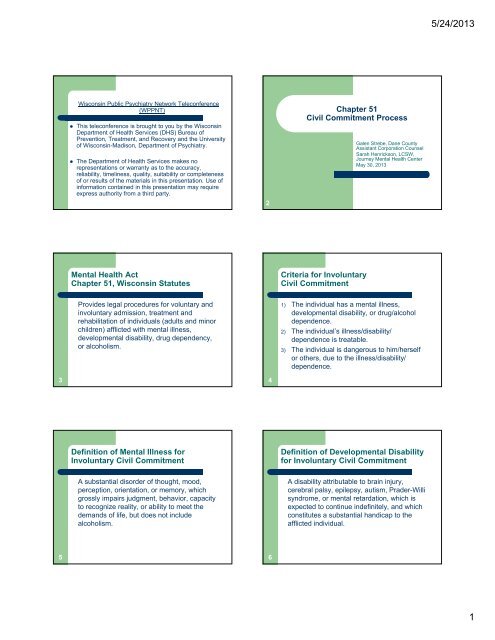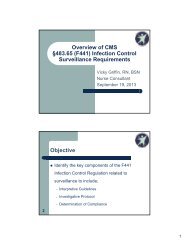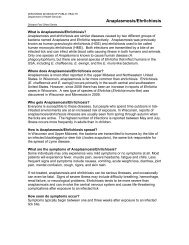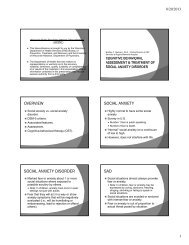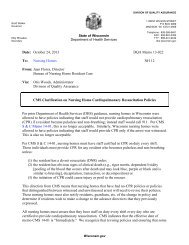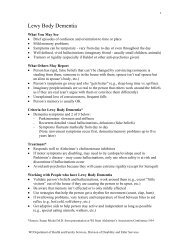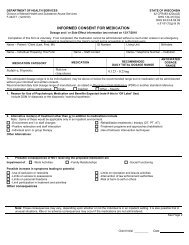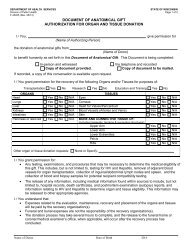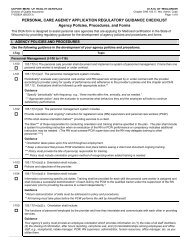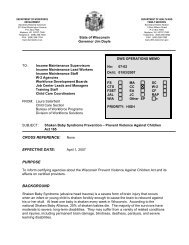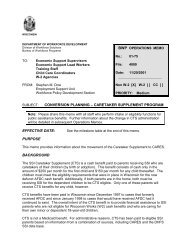Handout 2 - Wisconsin Department of Health Services
Handout 2 - Wisconsin Department of Health Services
Handout 2 - Wisconsin Department of Health Services
Create successful ePaper yourself
Turn your PDF publications into a flip-book with our unique Google optimized e-Paper software.
5/24/2013<br />
<strong>Wisconsin</strong> Public Psychiatry Network Teleconference<br />
(WPPNT)<br />
• This teleconference is brought to you by the <strong>Wisconsin</strong><br />
<strong>Department</strong> <strong>of</strong> <strong>Health</strong> <strong>Services</strong> (DHS) Bureau <strong>of</strong><br />
Prevention, Treatment, and Recovery and the University<br />
<strong>of</strong> <strong>Wisconsin</strong>-Madison, <strong>Department</strong> <strong>of</strong> Psychiatry.<br />
• The <strong>Department</strong> <strong>of</strong> <strong>Health</strong> <strong>Services</strong> makes no<br />
representations or warranty as to the accuracy,<br />
reliability, timeliness, quality, suitability or completeness<br />
<strong>of</strong> or results <strong>of</strong> the materials in this presentation. Use <strong>of</strong><br />
information contained in this presentation may require<br />
express authority from a third party.<br />
2<br />
Chapter 51<br />
Civil Commitment Process<br />
Galen Strebe, Dane County<br />
Assistant Corporation Counsel<br />
Sarah Henrickson, LCSW,<br />
Journey Mental <strong>Health</strong> Center<br />
May 30, 2013<br />
Mental <strong>Health</strong> Act<br />
Chapter 51, <strong>Wisconsin</strong> Statutes<br />
Criteria for Involuntary<br />
Civil Commitment<br />
Provides legal procedures for voluntary and<br />
involuntary admission, treatment and<br />
rehabilitation <strong>of</strong> individuals (adults and minor<br />
children) afflicted with mental illness,<br />
developmental disability, drug dependency,<br />
or alcoholism.<br />
1) The individual has a mental illness,<br />
developmental disability, or drug/alcohol<br />
dependence.<br />
2) The individual’s illness/disability/<br />
dependence is treatable.<br />
3) The individual is dangerous to him/herself<br />
or others, due to the illness/disability/<br />
dependence.<br />
3<br />
4<br />
Definition <strong>of</strong> Mental Illness for<br />
Involuntary Civil Commitment<br />
A substantial disorder <strong>of</strong> thought, mood,<br />
perception, orientation, or memory, which<br />
grossly impairs judgment, behavior, capacity<br />
to recognize reality, or ability to meet the<br />
demands <strong>of</strong> life, but does not include<br />
alcoholism.<br />
Definition <strong>of</strong> Developmental Disability<br />
for Involuntary Civil Commitment<br />
A disability attributable to brain injury,<br />
cerebral palsy, epilepsy, autism, Prader-Willi<br />
syndrome, or mental retardation, which is<br />
expected to continue indefinitely, and which<br />
constitutes a substantial handicap to the<br />
afflicted individual.<br />
5<br />
6<br />
1
5/24/2013<br />
Definition <strong>of</strong> Drug Dependence for<br />
Involuntary Civil Commitment<br />
A disease which is characterized by the<br />
dependency <strong>of</strong> an individual who uses one or<br />
more drugs to the extent that the individual’s<br />
health is substantially impaired, or his/her<br />
social or economic functioning is<br />
substantially disrupted.<br />
Definition <strong>of</strong> Alcoholism for<br />
Involuntary Civil Commitment<br />
A disease which is characterized by the<br />
dependency <strong>of</strong> an individual on alcohol, to<br />
the extent that his/her health is substantially<br />
impaired or endangered, and his/her social<br />
or economic functioning is substantially<br />
disrupted.<br />
7<br />
8<br />
Alcohol and Drug Commitments<br />
Standards <strong>of</strong> Dangerousness Required<br />
for Involuntary Civil Commitment<br />
9<br />
• Rarely done for minor children because very<br />
difficult to prove legal standards.<br />
• Requires established pattern <strong>of</strong> use, which<br />
causes substantial impairment <strong>of</strong> health and<br />
functioning, and which causes dangerousness<br />
to self or others.<br />
10<br />
1) Recent acts, attempts or threats <strong>of</strong> suicide or<br />
serious bodily harm to self.<br />
2) Recent acts, attempts, or threats <strong>of</strong> serious<br />
bodily harm to others, or violent behavior<br />
which places others in reasonable fear <strong>of</strong><br />
serious physical harm.<br />
3) A pattern <strong>of</strong> recent acts or omissions which<br />
evidences impaired judgment causing the<br />
individual to be an inadvertent danger to self.<br />
11<br />
Standards <strong>of</strong> Dangerousness Required<br />
for Involuntary Commitment (cont.)<br />
4) Mental illness causes the individual to be so<br />
gravely disabled that he/she is unable to<br />
satisfy life’s basic needs for nourishment,<br />
medical care, shelter, or safety.<br />
5) Individual’s psychiatric treatment history,<br />
coupled with his/her present mental<br />
deterioration due to incompetent decision to<br />
refuse psychotropic medication, causes<br />
likelihood that the individual will lose ability<br />
to function independently in the community.<br />
12<br />
Definitions <strong>of</strong> Treatment for<br />
Involuntary Civil Commitment<br />
Statutory: Those psychological, educational,<br />
social, chemical, medical, or somatic techniques<br />
designed to bring about the rehabilitation <strong>of</strong> an<br />
individual who has mental illness, developmental<br />
disability, drug dependency, or alcoholism.<br />
Jury Instruction: An individual is a proper subject<br />
for treatment if the administration <strong>of</strong> treatment<br />
techniques may control, improve, or cure his/her<br />
mental illness, developmental disability, drug<br />
dependency, or alcoholism.<br />
2
5/24/2013<br />
Methods <strong>of</strong> Initiating an Involuntary<br />
Civil Commitment Proceeding<br />
• Law Enforcement Emergency Detention<br />
• Treatment Director Emergency Detention<br />
• Three Party - Petition for Examination<br />
Law Enforcement<br />
Emergency Detention (ED)<br />
Law enforcement <strong>of</strong>ficers may take individual<br />
into custody, file a statement <strong>of</strong> emergency<br />
detention (ED), and detain that individual at<br />
an approved mental health detention facility<br />
based upon the <strong>of</strong>ficers’ belief, from either<br />
personal observation or reliable reports <strong>of</strong><br />
others, that the individual is mentally ill,<br />
developmentally disabled, or drug<br />
dependent, and dangerous to self or others.<br />
13<br />
14<br />
Law Enforcement<br />
Emergency Detention (cont.)<br />
Treatment Director<br />
Emergency Detention (ED)<br />
• Law enforcement <strong>of</strong>ficers must consult with<br />
crisis/mental health staff <strong>of</strong> the county <strong>of</strong> detention<br />
department <strong>of</strong> community programs.<br />
• County department crisis staff must approve the<br />
need for detention <strong>of</strong> the individual before law<br />
enforcement <strong>of</strong>ficers can complete an ED.<br />
• The receiving mental health detention facility/unit<br />
usually requires medical clearance <strong>of</strong> the individual<br />
prior to detention, to check for medical problems,<br />
drug or alcohol use, and to evaluate the individual’s<br />
mental status and treatment needs.<br />
●<br />
●<br />
●<br />
The Treatment Director <strong>of</strong> a mental health<br />
facility/unit may file a statement <strong>of</strong> Emergency<br />
Detention (ED) and detain a patient who has been<br />
admitted to the psychiatric facility/unit.<br />
ED must allege that the patient is mentally ill,<br />
developmentally disabled, or drug dependent, and<br />
dangerous to self or others.<br />
Treatment Director ED usually occurs when an<br />
individual is voluntarily admitted to a facility/unit, and<br />
later refuses treatment and/or requests discharge.<br />
15<br />
16<br />
Three Party - Petition for Examination<br />
Three Party - Petition for Examination<br />
(cont.)<br />
17<br />
• Three adults sign a sworn petition that is<br />
drafted by the County Corporation Counsel.<br />
• At least one <strong>of</strong> the 3 petitioners (signers)<br />
must have personal knowledge <strong>of</strong> the<br />
individual’s dangerous behavior.<br />
• Petition must allege that the individual is<br />
mentally ill, developmentally disabled, or<br />
drug dependent, and dangerous to self or<br />
others, and a proper subject for treatment.<br />
18<br />
• Petitioners who have not directly observed the<br />
individual’s dangerous behavior must provide a<br />
basis for their belief that the allegations are true.<br />
• The County Corporation Counsel files the<br />
petition with the court. After review, the judge<br />
may order detention <strong>of</strong> the individual by law<br />
enforcement to a mental health detention facility,<br />
or may just set the case for a probable cause<br />
hearing without ordering detention.<br />
• This process may take several days or more, so<br />
it should not be used for emergency situations.<br />
3
5/24/2013<br />
Probable Cause Hearing<br />
Probable Cause Hearing:<br />
Four Possible Outcomes<br />
19<br />
• Court hearing must be held within 72 hours <strong>of</strong><br />
individual’s custody/detention by law enforcement<br />
(excluding weekends and holidays).<br />
• Witnesses testify from personal observations about<br />
the allegations <strong>of</strong> dangerousness in the petition or<br />
ED, and doctor testifies about mental illness,<br />
disability, or dependence, and treatment.<br />
• After the hearing, the judge decides if there is<br />
probable cause (sufficient reason) to believe the<br />
allegations, and probable cause to detain and treat<br />
the individual at a mental health facility.<br />
20<br />
1) Case is dismissed for lack <strong>of</strong> sufficient evidence that<br />
the individual is mentally ill, developmentally disabled,<br />
drug dependent, or has been dangerous recently.<br />
2) Settlement Agreement is approved by the court.<br />
3) Case is converted to temporary (30 days) guardianship<br />
and protective placement or services if the individual’s<br />
condition is permanent and not treatable.<br />
4) Probable cause is found:<br />
• Final hearing is scheduled within 14 days <strong>of</strong> initial<br />
detention at mental health facility.<br />
• Two doctors are appointed by the court to examine<br />
the individual, and to submit written reports, with<br />
their findings, opinions and recommendations.<br />
Final Hearing (Trial)<br />
Final Hearing:<br />
Four Possible Outcomes<br />
21<br />
• Court hearing held within 14 days <strong>of</strong> the individual’s<br />
detention at a mental health facility, or 30 days if there<br />
is no inpatient detention after probable cause hearing.<br />
• Witnesses testify from personal observations about the<br />
dangerous behavior, and court appointed examiners<br />
(psychologists and/or psychiatrists) testify about mental<br />
illness, disability or dependence, and treatment.<br />
• After the hearing, the judge decides if there is clear and<br />
convincing evidence to commit the individual to either<br />
inpatient (initially) or outpatient treatment, and whether<br />
the individual is competent to refuse psychotropic<br />
medications.<br />
22<br />
1) Case is dismissed for lack <strong>of</strong> clear and<br />
convincing evidence that the individual is<br />
mentally ill, developmentally disabled, or drug<br />
dependent; or has been recently dangerous.<br />
2) Settlement Agreement is approved by court.<br />
3) Conversion to temporary guardianship and<br />
protective placement/services if condition is<br />
permanent and not treatable.<br />
4) Order <strong>of</strong> Involuntary Civil Commitment for<br />
treatment for up to 6 months.<br />
Chapter 51 Court Hearings:<br />
Rights <strong>of</strong> Minors<br />
Chapter 51 Court Hearings:<br />
Rights <strong>of</strong> Parents or Legal Guardians<br />
Minors have the right to:<br />
• be represented by adversary counsel at<br />
public expense.<br />
• have a closed hearing.<br />
• request an open hearing.<br />
• remain silent.<br />
• present and cross-examine witnesses.<br />
• have a jury trial.<br />
Parents/Legal Guardians have the right to:<br />
• be represented by counsel (at their own<br />
expense).<br />
• present and cross-examine witnesses.<br />
• make a statement to the court.<br />
23<br />
24<br />
4
5/24/2013<br />
Settlement Agreement<br />
Settlement Agreement (cont.)<br />
• A negotiated contract for treatment signed by the<br />
individual, his/her attorney, and the County<br />
Corporation Counsel, and approved by the court.<br />
• Waives the court hearings for a specified period <strong>of</strong><br />
time, up to 90 days.<br />
• Cannot be extended at end <strong>of</strong> time period, if<br />
individual is compliant with treatment.<br />
• Can be rescinded by County Corporation Counsel if<br />
the individual fails to comply with the treatment<br />
conditions.<br />
• Includes a list <strong>of</strong> treatment conditions the<br />
individual must comply with, including the<br />
maximum days <strong>of</strong> inpatient treatment.<br />
• Failure to comply with the treatment<br />
conditions may result in the individual’s<br />
detention at a mental health facility for further<br />
commitment proceedings.<br />
25<br />
26<br />
Order <strong>of</strong> Involuntary Civil Commitment<br />
for Treatment<br />
Outpatient Treatment Conditions<br />
27<br />
If there is clear and convincing evidence that<br />
the individual is mentally ill, developmentally<br />
disabled, or drug dependent, and dangerous<br />
to self or others, and a proper subject for<br />
treatment, the court may commit an<br />
individual to the care and custody <strong>of</strong> the<br />
county department <strong>of</strong> community programs<br />
for inpatient and/or outpatient treatment for<br />
up to 6 months.<br />
28<br />
• Given to committed individuals upon transfer to<br />
outpatient treatment, requires them to comply<br />
with the listed conditions determined necessary<br />
to ensure treatment and safety in the<br />
community.<br />
• The individual’s failure to comply with the<br />
conditions may result in his/her transfer back to<br />
a mental health facility by law enforcement.<br />
• Psychotropic medications may be administered<br />
only voluntarily as an outpatient treatment<br />
condition.<br />
Order To Treat<br />
Order To Treat (cont.)<br />
29<br />
The court may order that medication may be<br />
administered to an individual regardless <strong>of</strong><br />
his/her consent (involuntarily and/or forcibly):<br />
• After a finding <strong>of</strong> probable cause, but the order is<br />
effective only until the final hearing.<br />
• At or after an order <strong>of</strong> commitment is granted, and<br />
is effective for the duration <strong>of</strong> the commitment.<br />
30<br />
The court must find sufficient evidence to believe<br />
that the individual is not competent to refuse<br />
psychotropic medications, due to mental illness/<br />
disability/dependence, because he/she is either:<br />
• Incapable <strong>of</strong> expressing an understanding <strong>of</strong> the<br />
risks, benefits, and alternatives <strong>of</strong> the medications;<br />
OR<br />
• Incapable <strong>of</strong> applying an understanding <strong>of</strong> the<br />
medications to his/her own condition to make an<br />
informed choice to accept or refuse the medications.<br />
5
5/24/2013<br />
Extension <strong>of</strong> Commitment<br />
(Recommitment)<br />
Monitoring Settlement Agreement/<br />
Treatment Conditions <strong>of</strong> Commitment<br />
• Prior to expiration <strong>of</strong> a commitment, the county<br />
department to which an individual is committed may<br />
file a recommendation to extend the commitment.<br />
• County Corporation Counsel files petition for<br />
recommitment alleging the individual continues to<br />
need treatment, is dangerous without treatment, and<br />
is unlikely to comply without court ordered treatment.<br />
• Order <strong>of</strong> Extension <strong>of</strong> Commitment can be up to 12<br />
months, if the court finds that there is a “substantial<br />
likelihood that the individual would become a proper<br />
subject for commitment if treatment was withdrawn.”<br />
• Noncompliance with the treatment conditions does<br />
not automatically result in transferring the individual<br />
back to a mental health detention facility.<br />
• Need for redetention is based on level <strong>of</strong><br />
noncompliance, mental stability, dangerous<br />
behavior, and/or potential for dangerousness.<br />
• If individual is unstable and in need <strong>of</strong> inpatient<br />
treatment and willing to comply, he/she can be<br />
voluntarily admitted without court involvement.<br />
31<br />
32<br />
Why Are Minor Children ED’d?<br />
Where Are Minor Children<br />
Admitted for ED’s?<br />
33<br />
• Effective 8/1/06, <strong>Wisconsin</strong> law permits<br />
parents/legal guardians to sign their minor<br />
child (under age 18) into a psychiatric<br />
hospital for treatment without the child’s<br />
consent.<br />
• However if the child is physically combative<br />
and/or unwilling to accept treatment,<br />
voluntary admission may be inappropriate or<br />
unavailable.<br />
34<br />
• Winnebago Mental <strong>Health</strong> Institute,<br />
– Male and female children and adolescents<br />
• Private hospitals and county facilities<br />
– Unlike the state institutions, these<br />
hospitals/facilities are not required to<br />
accept emergency detentions, but some<br />
do at their discretion.<br />
Are There Specialty Treatment Units<br />
For Minor Children?<br />
What Can Families Expect from the<br />
Treatment Facility?<br />
35<br />
• Developmental Disabilities: Winnebago must<br />
accept EDs but may transfer to Northern or<br />
Central <strong>Wisconsin</strong> Center.<br />
• Alcohol and Drug Treatment: Youth <strong>Services</strong><br />
Unit at Winnebago treats dual diagnoses<br />
(AODA and mental illness).<br />
36<br />
• Consultation with social worker and/or treating<br />
psychiatrist.<br />
• Information about assessment <strong>of</strong> the child’s<br />
condition, and treatment recommendations.<br />
• Parental consent must be obtained prior to<br />
administering any medication or changes.<br />
• Family phone calls and visits are allowed as is<br />
appropriate.<br />
• Social worker will coordinate outpatient plan with<br />
family and community providers.<br />
6
5/24/2013<br />
What Can Families Expect After<br />
Discharge to Outpatient Treatment?<br />
Contact Information<br />
37<br />
• If commitment case is dismissed, there is no<br />
further court involvement until/unless a new<br />
involuntary civil commitment is initiated.<br />
• When individual is transferred to outpatient<br />
with settlement agreement or treatment<br />
conditions, the individual’s county <strong>of</strong><br />
residence will provide services and<br />
monitoring, and will decide if/when individual<br />
needs to return to inpatient treatment.<br />
38<br />
Galen Strebe<br />
Dane County Assistant Corporation Counsel<br />
210 Martin Luther King Blvd., Room 419<br />
Madison, WI 53703<br />
Phone: 608-266-9004<br />
Fax: 608-267-2504<br />
E-mail: strebe@county<strong>of</strong>dane.com<br />
Sarah Henrickson, LCSW<br />
Emergency <strong>Services</strong> Unit, Journey Mental <strong>Health</strong> Center<br />
625 W. Washington Avenue<br />
Madison, WI 53703<br />
Phone: 608-280-2600<br />
Fax: 608-280-2703<br />
E-mail: sarah.henrickson@journeymhc.org<br />
7


